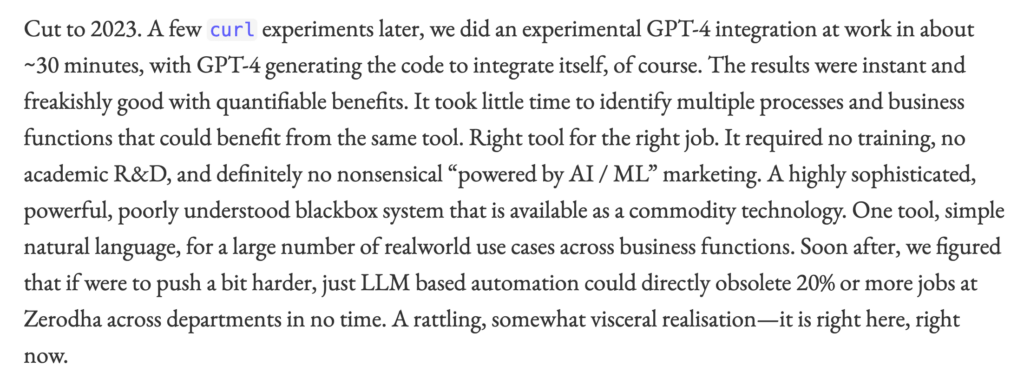I recently listened to an insightful chat between Kunal Shah and Kailash Nadh of Zerodha, where they delved into the complex topic of artificial intelligence (AI) and its potential impacts. It was originally published in June 2023 by CRED Curious, but I listened to it last week. Here's what I've jotted down over the past few days.
As someone interested in technology and its interactions with society, I found Kailash's perspectives on AI thoughtful and nuanced. He highlighted how AI is not a new concept philosophically, but recent technological developments have allowed for unprecedented progress.
Kailash began by emphasizing that while AI has the potential to transform our lives, its impacts will vary significantly depending on the context. This diversity is essential to recognize, as AI's integration into different industries and economic systems will play out in complex ways. A key point that resonated with me was the paradox of AI's ability to create new possibilities while disrupting existing jobs and processes. In the past, new technologies largely replaced blue-collar labor, but AI is uniquely positioned to automate cognitive tasks once considered the domain of human intelligence alone.
Models like GPT-4 demonstrate how far natural language processing has come, raising exciting questions about what constitutes meaningful work and value creation in an age of advanced AI. At the same time, Kailash cautioned against broad generalizations, given the context-specific nature of technological disruptions. Different countries and companies will integrate AI according to their circumstances. Portraying AI's trajectory as a uniform, monolithic process risks oversimplifying this multifaceted issue.

Thinking about AI's potential to replace high-skilled white-collar jobs like content creation and strategic thinking is sobering. While new opportunities that leverage people's natural strengths like creativity, compassion, and complex problem-solving may emerge, managing such large-scale changes poses severe economic and social challenges. Having gainful employment that allows contributing value to others is integral to well-being for many. Figuring out how societies can successfully navigate impending upheavals to existing work models will be paramount.
Kailash's perspective on AI's exponential pace of progress also resonated with me. Given AI's self-learning capabilities and the acceleration of underlying computational power based on Moore's Law, it's likely that advanced general artificial intelligence could arrive sooner than expected. Though notions of human-level or superintelligent AI remain speculative, strategizing prudent ways to maximize AI's benefits while mitigating risks seems advisable. Proactively addressing existential economic and environmental issues will be crucial as technologies advance.
Kailash's views on addressing climate change through decisions like not having children may align with many people's views. As someone interested in policy solutions for sustainability challenges, I appreciate his emphasis on responsible contributions within one's control. The future consequences of today's actions on planetary and social systems are undeniably serious. While uncertainties abound, focusing on bettering the present through evidence-based considerations of long-term trends seems a sensible approach.
Kailash also raised thought-provoking points about how AI may disrupt content industries. Models that can generate vast amounts of personalized media, art, and creative works on-demand challenge traditional notions of scarcity and value. It's easy to see how such technologies could reshape entire sectors. However, whether AI-generated content would retain the same cultural significance or human connection as works authored by real people is debatable. The prospect of AI writing entire books or scripts seems implausible for now. But who knows what may be possible in a few decades.
Kailash made insightful observations about IT services and AI when discussing specific industries. Legacy systems in many large enterprises present significant roadblocks to modernization efforts. However, highly skilled IT jobs relying primarily on routine coding or maintenance tasks may progressively shift overseas or be automated. For India's prominent IT sector that employs millions, this portends disruptions requiring strategic pivots. Proactive upskilling of India's technical talent will thus be essential to maintain competitiveness in an AI-transformed global economy.
Finally, beyond just the practical considerations, I found Kailash's overarching message thought-provoking - that focusing our efforts on ethical progress and helping others provides meaning, even amid uncertainties. As technologies radically reshape our world in the coming decades, core human values of compassion and social responsibility will remain imperative. Approaching advancements like AI with open yet prudent minds prioritizing evidence-based policymaking that strengthens societies, economies, and the environment seems constructive.
In closing, discussions on AI are more complex and not one-dimensional. As this interview underscored, a balanced perspective is needed due to AI's diverse implications across contexts. While displaced employment is a genuine concern, new opportunities may also emerge. Managing disruptions to uphold people's well-being amid accelerated technological change is a defining challenge. Overall, actively addressing existential issues and collectively working to apply innovations for society's long-term betterment appear prudent guiding principles. The future of AI and our role in shaping it remains unscripted.
Credits: The cover image is the thumbnail CRED set on YouTube.